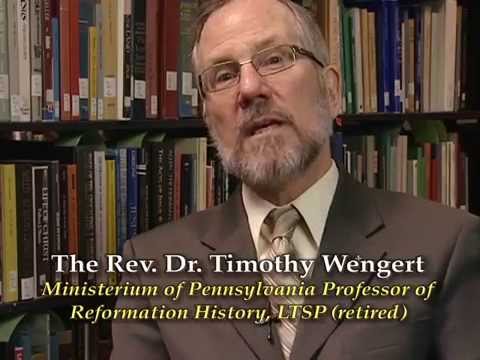Worship and Doctrinal Works with ELCA? Sure! Piestism = Unionism = LCMS-WELS-ELS
Efficacy of the Word
Denying the efficacy of
the Word is the key to the errors of Zwingli, Calvin, and all Enthusiasts –
those who separate the Spirit from the Word. Efficacy is foundational throughout
the Bible, starting with Genesis 1. Basic to Zwingli and Calvin is denial of
this divine energy always working with the Word and never apart from the Word.
They consider the Bible itself as “dead letter” - unless the interpreter makes
it come alive, or germane and appealing. One example from Calvinist lore is –
the Word is like an iron statue in a garden, pointing the way but not providing
the energy.
Rejection of the Means of Grace
The Means of Grace are
the invisible Word in preaching and teaching, the visible Word in Holy Baptism
and Holy Communion. Zwingli mocked the sacraments, saying the Holy Spirit did
not need a vehicle, like an ox cart (Ratio Fidei). Calvin mocked Holy
Communion in the Institutes in childish questions about the Blood and
Body of Christ. Today the term often used for the sacraments is – ordinances –
laws. Christians should obey these commandments, if only as a witness to
others, but baptism and communion do not convey forgiveness.
Reason Dominates Faith, Replaces Faith
Biblical doctrine is
not a long cafeteria line where people can pick what most appeals to them. Zwingli
and Calvin placed reason above faith, which meant excluding what they rejected
rather than studying the Scriptures to understand and trust the mysteries
revealed by the Holy Spirit. Young Calvinists – as they often admit - become
old Unitarians, and the Calvinism of the founding denominations becomes the
Green New Deal woke activism of the present.
Pietism – A Troubled Merger of Calvinism and Lutheran Doctrine
Unfortunately, the Lutherans
were drawn into the constant doctrinal attacks waged by the late-arriving Calvinists,
who sought to replace the Reformation with their deformation. This fostered the
misnamed era of Lutheran Orthodoxy, where the stage was set with Latin terms
countered by Latin terms, a new Talmud where the Word itself was surrounded by
so many layers of expert testimony that the meaning was lost. Spener stepped
into battle as the first ecumenical theologian – take note of that term.
He was a Lutheran impressed by the Calvinists and Catholics. His two most
important contributions (mistakes) were the cell group and doctrinal indifference.
The cell group moved
the definition of the Church into the form of a small group of laity who prayed
and studied the Bible. That was – and is – the real Church. The congregation is
for them - only a convenient place to organize the cells. The cells are
superior to the others in the congregation. One modern writer said, “The
minister is only a pastor, but we are apostles.”
Spener placed love over
sound doctrine, in contrast to St. Paul and Luther, who taught love as the
fruit of the Gospel Word. This indifference was promoted in the name of
stopping the fights, but Pietism started a new era of battles. Since the
Pietists were always the holy ones, what they did was fine, even though the
unredeemed fought against them.
Pietism Was the Midwife of Stephan, Walther
Stephan had all the
marks of a Pietist leader:
·
The Bohemians were Pietists, through
Zinzendorf.
·
Stephan was a Bohemian.
·
His congregation was set up for Bohemians
and allowed to have cell groups on the property. Zinzendorf originally donated
the property.
·
Stephan led cell groups on the property,
and breaking the conventicle laws, in other locations.
·
Stephan had his initial congregation and
another gathering there, comprised of Christians who came to hear him speak.
·
Stephan became the leader of the Walther
circle of pastors, who looked for a leader after their initial cell group guru,
Kuehn, moved away and died.
CFW Walther and his
brother grew up in a rationalistic pastor’s household and had their only
academic training at Leipzig University, whose faculty was mostly rationalistic.
The state church was rationalistic and distrusted the Pietists. The older
brother led CFW to join the Kuehn cell group.
CFW Walther’s Pietism
was plain:
1.
He rejected the rationalistic era, but was
still given a pastoral call. Was he a fox or a chameleon?
2.
His associations, his closest friends,
were Pietists.
3.
His group moved to Stephan when Kuehn
died.
4.
He served as the enforcer for Stephan,
making sure everyone in the circle obeyed Stephan or were shunned until they
begged forgiveness.
5.
In their purity, the Walther group
refused to see the adultery of Stephan and CFW later blamed it on Stephan’s
wife.
6.
Walther did not become the new Luther in
America but replaced Stephan – not as the bishop but as the pope.
7.
He spent a lifetime replacing the Chief
Article of Christianity with Halle University’s Objective Justification.
8.
He tried to support his Justification
without Faith by teaching Election without Faith.
9.
His dishonest manipulation of the call
gave the job to Franz Pieper, who established the Synodical Conference canon by
the time of his death.


